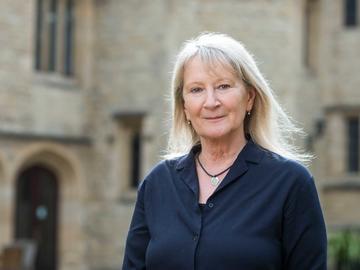Professor Marina Jirotka

BSc MA DPhil MBCS MACM CITP
Professor Marina Jirotka
Professor of Human Centred Computing
Fellow
Interests
Throughout my career I have been concerned with bringing a richer comprehension of socially organised work practices and interaction into the process of engineering technological systems. My current work focusses on how new developments in machine learning and AI can be shaped to respect human agency, ensuring accountability of systems and the digital rights of individuals and communities.
I am at the forefront of recent work in Responsible Innovation in the UK and the European Union concentrating on:
- the theoretical and conceptual underpinnings of new forms of governance for RI - new methods for the dissemination of materials and innovative ways of engaging the public in debates on RI in ICT
- unpacking the practices and concepts of innovation of digital systems in the context of professional organisations
- investigating new, and enhancing existing methods for RI practice for digital system developers
- creating a social charter for embedding novel platforms into Smart Societies to provide enhanced agency for people and communities
Biography
As Professor of Human Centred Computing I lead a team focused on responsible innovation in a variety of advanced technologies - machine learning and AI, quantum technologies, social media technologies and the digital economy.
Early in my career I collaborated with BT to develop a video-based ethnographic method for use in Requirements Engineering. This work helped address socio-technical challenges for City of London trading rooms, service centres and control rooms and served as the foundation for my doctoral thesis at Oxford. An Investigation into Contextual Approaches to Requirements Capture.
From 2003, my research focussed on e-Research applications, particularly e-Health. As a requirements engineer on a flagship e-Science project, eDiaMoND, I became interested in notions of collaboration and trust in clinical practice and in the sciences more generally. My research projects included:
- the importance of intellectual property rights in collaborative medical databases: ESRC Copyright Ownership of Medical Data in Collaborative Computing Environments
- usability and project management in eResearch projects: EPSRC Embedding e-Science Applications: Designing and Managing for Usability
- the social shaping of eResearch infrastructure and discipline-specific concerns. ESRC Ethical, Legal and Institutional Responses to Emerging e-Research Infrastructure, Policies and Practices
More recently, through collaborations with industry, government and other organisations, my investigations have focussed on the digital economy. Early EPSRC Digital Economy work included
- the emergent practices and capabilities of social networking systems: how to develop understandings of services, exchange and interaction that benefit the UK economy: EPSRC Innovative Media for the Digital Economy (IMDE)
- the economic, social, legal and regulatory issues to emerge in the next generation of the internet: EPSRC Opportunities and Challenges in the Digital Economy: an Agenda for the Next-generation Internet.
Appointments
2004: Elected Governing Body Fellow of St Cross College
2006: James Martin Research Fellow, seconded to the Oxford eResearch Centre.
2006: Associate Director of the Oxford e-Research Centre
2006: Associate Researcher of the Oxford Internet Institute
2007: ESRC/SSRC Visiting Fellowship to UCLA, and PARC to develop a systematic understanding of data sharing to inform design of e-Research systems.
2009: Deputy Director of ESRC's National Strategic Directorate of the eSocial Science Programme.
2011: Chartered IT Professional of the BCS sitting on the ICT Ethics Specialist Group committee
2018: Elected to UKCRC
2018: EPSRC Established Career Fellowship
2018: Board Member of the Society for Computers and Law
Expert opinion
As part of the Digital Wildfire project I have given evidence to the House of Lords Select Committee on Artificial Intelligence and also the All-Party Parliamentary Group on Artificial Intelligence
I was specialist advisor to the House of Lords Select Committee on Communications for their inquiry into Children and the Internet.
I was an Expert Witness to assist the Open Innovation meets Big Data consortium (Nissan, GE, Airbus, Ordnance Survey, Ferroviale ++) who are working together to generate new revenues from data
I am a working group member of the IEEE P7000 standard Model Process for Addressing Ethical Concerns During System Design
I sit on the Steering Committee for the APPG on Data Analytics
I am a member of the Steering Committee for the Society for Computers and Law
Novel contributions
As part of the Responsible Innovation (RI) agenda I have conducted a significant amount of public engagement activity and have developed novel ways of doing this. The Digital Wildfire project initiated youth panels and competitions on important topics such as Bias in Algorithms, What it means to be a Good Digital Citizen and How to stay safe on the Internet. These were highly successful exercises where young people were able to express their views, either through artwork or on panels, on a variety of internet-related issues. The work submitted provided a valuable resource to identify how to support digital maturity and resilience among young people.
With other members of my team I developed the idea of the Ethical Hackathon during work on the FRRIICT project. This innovative method engages stakeholders from different backgrounds and disciplines to work together on addressing an ethical issue as a problem-solving activity. This has also been extended to work in Africa on frugal innovation through a GCRF award.
Selected publications
Activities
- Responsible Research and Innovation
- Software Engineering
- Cyber Security Oxford
- Requirements Engineering
Projects
Completed Projects
- Embedding e-Science Applications
- eHorizons
- Oxford eSocial Science
- e-Infrastructure Use Cases and Usage Models
- VRE
- GREAT
- RESPONSIBILITY
- SmartSociety
View current and past supervised students and postdocs here.





